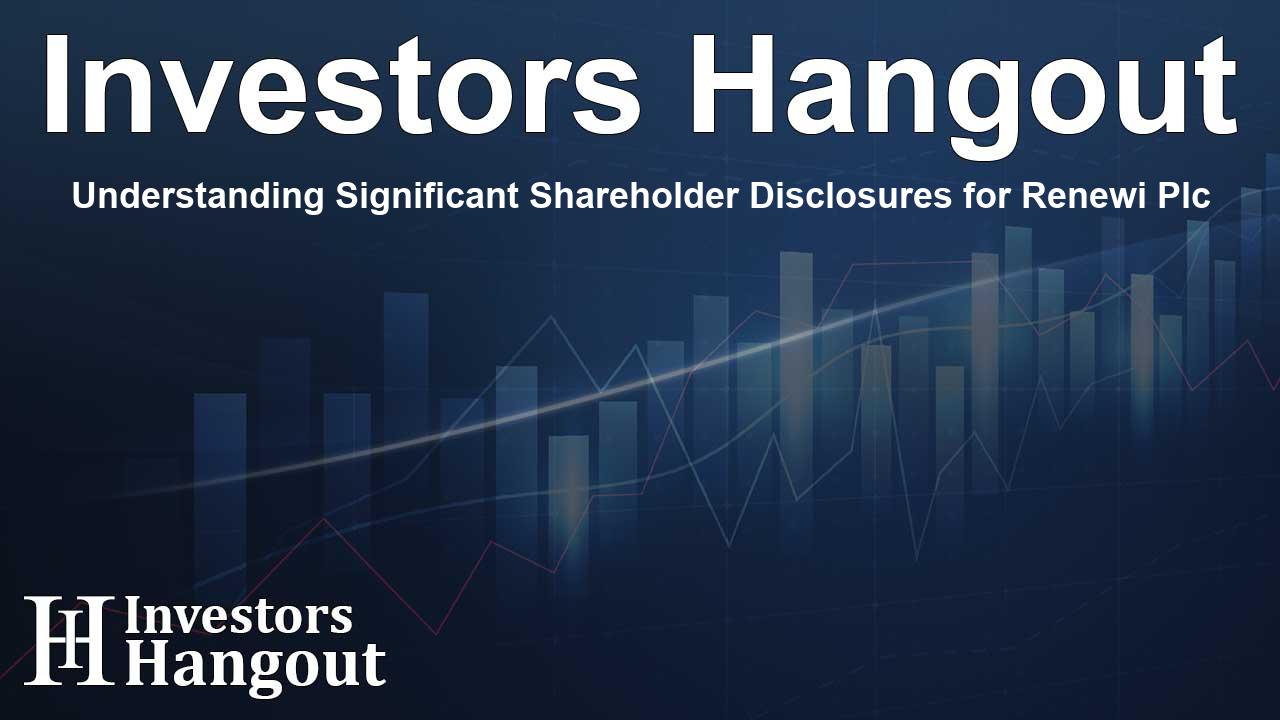Understanding Significant Shareholder Disclosures for Renewi Plc

Introduction to Shareholder Disclosures
In the world of finance and corporate governance, shareholder disclosure plays a critical role in maintaining transparency and accountability. This process is governed by regulations that require individuals and entities with significant holdings in a company to report their positions. Such regulations protect market integrity and give investors confidence in the information provided by companies. One such prominent company is Renewi Plc, known for its operations in waste management and recycling.
Key Information Disclosure
At the heart of the disclosure is the need for clear communication regarding who owns what within the listed companies. For instance, when shareholders own 1% or more of a company’s relevant securities, they must disclose specific details. This aids in ensuring that the overall market understands who has significant influence over company operations. In this particular instance, the discloser is Rathbones Group Plc, which is in possession of a notable quantity of relevant securities associated with Renewi Plc.
Disclosure Requirements
The disclosure must include comprehensive details such as the full name of the person or entity, the name of the issuer, and the kinds of relevant securities involved. For Renewi Plc, details surrounding the interests and any short positions held must be clarified, showcasing a clear image of the current shareholder structure.
Each shareholder must also specify the nature of their interest in the relevant securities which offers insights into whether they are holding for long-term investment or positioning for short-term strategies.
Positions Held by Shareholders
When a position is disclosed, it is fundamentally about the interest that the disclosing party has in the securities. For Rathbones Group Plc, the declaration indicates that they currently hold 1,291,539 £1 Ordinary Shares of Renewi Plc, equating to a 1.60% stake in the company. Such disclosures inform the public regarding the magnitude of influence a shareholder has within the company.
Implications of Shareholding
Holding a significant number of shares grants a certain degree of sway in corporate decisions, which can extend to voting rights on crucial matters such as mergers, acquisitions, and strategic shifts within the company. This transparency allows other investors and stakeholders to gauge the level of confidence these major shareholders possess relative to the company’s future.
Dealings By Shareholders
In addition to positions held, shareholders are also required to declare any dealings in the securities. For example, Rathbones Group Plc executed sales of £1 Ordinary Shares of Renewi Plc, with transactions documented detailing the volume and price per unit. The latest reported sales indicate that 1,215 shares were sold at a price point of 855.431p each, and another 2,000 shares were sold at 855.43p each.
Such transactions reveal shifts in investor sentiment and can often signal broader market movements regarding the company or its sector as a whole.
Other Information and Compliance
Moreover, further disclosures involve any indemnity arrangements or understandings that could impact how shares are handled. In the case of Rathbones Group Plc, there were no stated indemnity arrangements, showcasing a straightforward transactional history with Renewi Plc. Compliance with these requirements is underpinned by the Takeover Code, ensuring that all regulations governing public disclosures are rigorously adhered to.
Investors and stakeholders are encouraged to stay informed about these matters, as they can significantly impact investment decisions and perceptions of management's effectiveness.
Conclusion
In closing, understanding shareholder disclosures, especially for firms such as Renewi Plc, fosters a more profound respect for financial transparency and market regulation. Such practices empower investors and maintain a balanced playing field, where everyone competes based on the same shared knowledge. Knowing who holds significant stakes and how they are managing those interests paves the way for informed decision-making in the investing landscape.
Frequently Asked Questions
What is a public opening position disclosure?
A public opening position disclosure informs the market about significant holdings by shareholders, thus ensuring transparency and compliance with regulations.
Who is responsible for making disclosures?
Disclosures are typically made by individuals or entities that have interests in relevant securities representing 1% or more of a company's composition.
What information must be disclosed?
Key information includes the full name of the discloser, their relevant securities holdings, and any transactions involving those securities.
How do dealings impact the market perception?
Dealings, such as buying or selling shares, can influence market perception by suggesting confidence or lack thereof in a company’s future prospects.
Where can I find more information on shareholder disclosures?
Further information can be obtained from the company’s regulatory announcements, or the relevant market guidelines outlining disclosure obligations.
About The Author
Contact Dylan Bailey privately here. Or send an email with ATTN: Dylan Bailey as the subject to contact@investorshangout.com.
About Investors Hangout
Investors Hangout is a leading online stock forum for financial discussion and learning, offering a wide range of free tools and resources. It draws in traders of all levels, who exchange market knowledge, investigate trading tactics, and keep an eye on industry developments in real time. Featuring financial articles, stock message boards, quotes, charts, company profiles, and live news updates. Through cooperative learning and a wealth of informational resources, it helps users from novices creating their first portfolios to experts honing their techniques. Join Investors Hangout today: https://investorshangout.com/
The content of this article is based on factual, publicly available information and does not represent legal, financial, or investment advice. Investors Hangout does not offer financial advice, and the author is not a licensed financial advisor. Consult a qualified advisor before making any financial or investment decisions based on this article. This article should not be considered advice to purchase, sell, or hold any securities or other investments. If any of the material provided here is inaccurate, please contact us for corrections.
